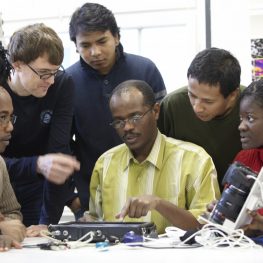Hochschule für Technik Stuttgart
| Location | Stuttgart is a vibrant, fascinating city and the state capital of Baden-Wuerttemberg. It is the economic, cultural, sporting and social hub of a region in the heart of Europe with more than 2.5 million inhabitants. The city is surrounded by beautiful countryside; the Black Forest and Lake Constance are highlights in southern Germany and are not far away. The University of Applied Sciences (UAS) is located in the heart of Stuttgart. The UAS has a long history with a rich tradition in engineering education since 1832. |
| Course focus | The M.Sc. course aims at educating future decision makers and senior engineers of information and land management projects, national authorities for mapping, photogrammetry, land consolidation, cadastre, forestry, agriculture, rural and urban planning or environment monitoring.
The postgraduate course offers scientific and practice-oriented education and training in the fields of photogrammetry, remote sensing and geoinformatics. An important objective is the transfer of up-to-date techniques to practice under different technological conditions. Photogrammetric technology is trained on modern digital workstations including sophisticated analytical systems. Focus is on processing aerial photographs, from scanning, automated aero triangulation and acquisition of digital elevation models, to orthoimage generation and topographic and thematic mapping. Gaining experience in working with alternative data sources of increasing importance, like high resolution remote sensing satellites and radar and airborne laser scanning, round off modern photogrammetric education. The main topics focused on in the field of geoinformatics are the acquisition, storage, analysis, retrieval and display of spatial related data, concerning both earth’s physical features and the man-made environment. Studying the methods for data modelling in geoinformation systems, design and handling of diverse databases, GIS-data formats, GIS customisation including programming, all accompanied by intensive training are important parts of the postgraduate course. Most recent developments like world wide web technologies, 3D-visualisation and integration of GIS and photogrammetry prepare course participants for the future. A full-time research project aiming at the elaboration of a Master’s the- sis within six months concludes the programme. |
| Target group | The course is designed for all kinds of professional producers or users of geo-data (e.g., in photogrammetry, geodesy, civil engineering, land surveying, agriculture, cartography, forestry, geography, geology), in particular from developing countries, who are involved as decision makers or project engineers in the acquisition, administration and use of geo-data in the context of geoinformation systems, photogrammetry and remote sensing. |
| Course Structure
Course language |
HFT_PG_ScheduleModules_2018
English |
| Entry requirements |
|
| Degree Awarded | Master of Science (M.Sc.) in Photogrammetry and Geoinformatics |
| Course Begins | Every year in October |
| Course Duration | 18 months (two semesters and six months supervised study with Master’s thesis) |
| Duration of German language course prior to beginning of programme | 2 months (for students awarded a DAAD-scholarship) |
| Remarks |
|
Stuttgart University of Applied Sciences
Schellingstraße 24D, 70174 Stuttgart
Prof. Dr.-Ing. Dr.hc. Dietrich Schröder (Programme Director)
M.Sc. Barbara Paschmionka (Programme Coordinator)
Tel: +49 (0)711 / 8926-2607
Fax: +49 (0)711 / 8926-2556



